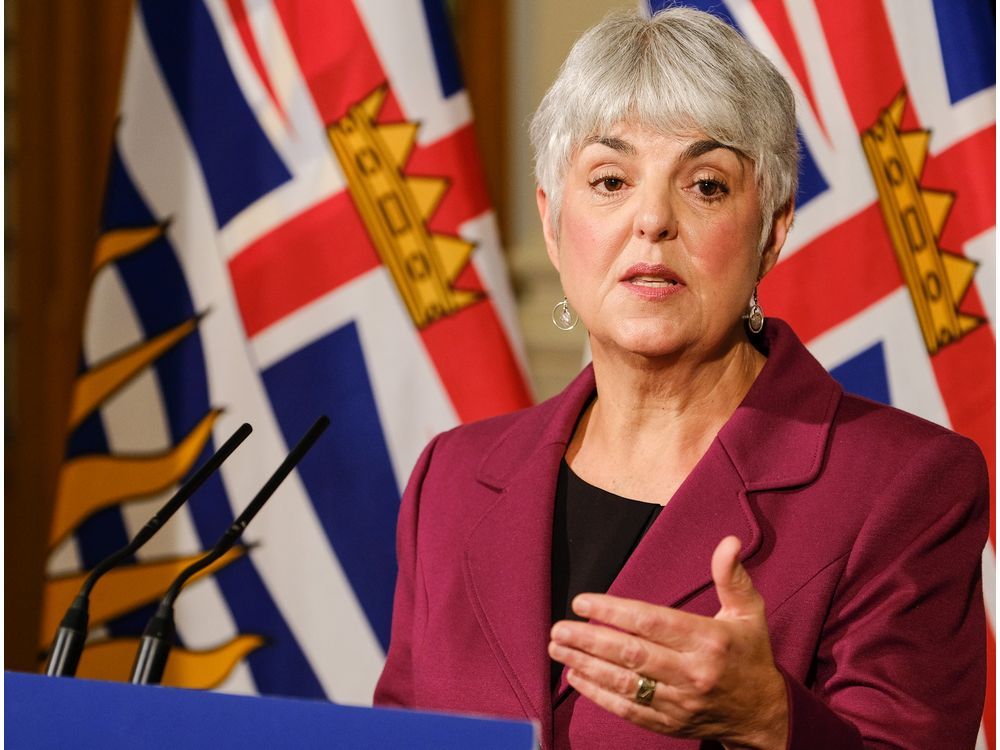B.C. budget surplus projection continues to shrink

Credit to Author: Rob Shaw| Date: Tue, 26 Nov 2019 22:28:50 +0000
VICTORIA — B.C.’s finance minister continues to hang to a shrinking budgetary surplus amid slumping retail sales, a collapsing forestry sector and worsening losses at the Insurance Corporation of B.C.
Carole James lowered the projected budget surplus to $148 million during her second quarter financial update Tuesday. That’s a $31 million drop from September’s first quarter figures, and a larger correction from the $274 million surplus projected in February’s 2019/20 budget.
Nonetheless, James promised to hold course on her plans to balance the books by looking for more savings within ICBC and continuing cutbacks to discretionary spending within government.
James still has a $550 million contingency allowance remaining, as well as $500 million in a forecast allowance, according to Tuesday’s figures. That gives her roughly $1 billion in emergency financial wiggle room for the last half of the fiscal year, ending March 31, 2020.
“People can look at our budget and see those levels of prudence built in, and they can see those funds there for the risks that are there,” said James.
A slight bump in income tax revenues and refundable tax credits also offset some of the losses.
The largest risk to the budget remains ICBC, which lost a court case to limit the use of medical experts last month and Attorney General David Eby has said will need to take a $400 to $500 million hit this fiscal year.
The negative impact is not reflected in the thiner $148 million surplus, because James said ICBC is still trying to figure out its exact losses.
“ICBC is looking at options to be able to mitigate the court decision,” said James.
“So until we get that information in, until we take a look at what savings they may project from a different direction or another direction, we won’t be able to account for how much that’s going to take out of the budget.”
She said it would be the “worst case scenario” if the entire amount had to come out of contingency or forecast allowances.
ICBC has lost almost $2.5 billion over the past two years due to rising claims costs and legal fees. The corporation’s projected deficit for this year has risen from $50 million to $91 million, due to historic loss claims, separate from the outstanding court losses.
James said she continues to plan for a new balanced budget in February and brushed off any suggestion she change course or consider deficit spending to fund her party’s promises.
“The job is to the manage the economy well for the people of British Columbia, to make sure you are spending within your means, that you are balancing the budget that you are providing that support,” she said.
Forest revenue has dropped 11 per cent and is projected to generate $133 million less for the treasury than was expected. Mills and forestry operations across the province have been closing in record numbers the past few months, and roughly 4,100 jobs have been lost in the sector.
“I’m concerned first and foremost for the communities in British Columbia, for the people and the families who are impacted by the downturn in the forest industry,” said James. “It’s an industry that has built British Columbia, and people are really struggling right now.”
The sector is seeing an 18.4 per cent decline in exports, with projected Crown harvest volumes falling from 57 million cubic metres in the February budget to 46 million cubic metres in Tuesday’s financial update, an amount that government officials say may be a historic low.
Provincial sales tax revenue is down $49 million due to slow retail sales on things like building supplies, new appliances and vehicles, which James said is the first sign from consumers they may be worried about the economic outlook ahead.
The property transfer tax – in recent years of the real estate boom a cash cow for government – continues to drop another $35 million due to a slow housing market, though provincial estimates are that the average price of housing in B.C. is set to return to almost the level seen in 2017.
B.C.’s cannabis sales targets have also missed their mark in the first year of legal cannabis sales, off $18 million from projections due mainly to the slow rate at which stores were allowed to open and less demand for the product, according to the financial documents.
James said she’s “very pleased” with savings found by discretionary cutbacks to travel, contract staff and other discretionary spending, and she expects those cuts to continue.